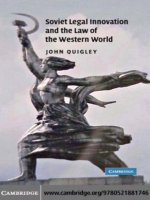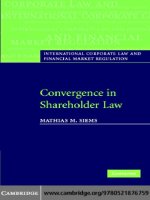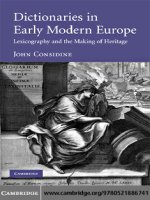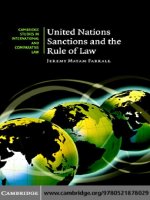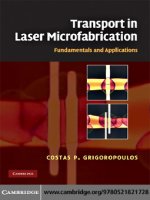0521800854 cambridge university press aliens in medieval law the origins of modern citizenship jan 2001
Bạn đang xem bản rút gọn của tài liệu. Xem và tải ngay bản đầy đủ của tài liệu tại đây (994.07 KB, 264 trang )
This page intentionally left blank
ALIENS IN MEDIEVAL LAW
The Origins of Modern Citizenship
This original re-interpretation of the legal status of foreigners in medieval
England boldly rejects the canonical view which has for centuries dominated the imagination of historians and laymen alike. Keechang Kim
proposes a radically new understanding of the genesis of the modern legal
regime and the important distinction between citizens and non-citizens.
Making full use of medieval and early modern sources, Kim offers a
compelling argument that the late medieval changes in legal treatment of
foreigners are vital to an understanding of the shift of focus from status to
the State, and that the historical foundation of the modern State system
should be sought in this shift of outlook. The book contains a reevaluation of the legal aspects of feudalism, examining, in particular, how
the feudal legal arguments were transformed by the political theology of
the Middle Ages to become the basis of the modern legal outlook. This
innovative study will interest academics, lawyers, and students of legal
history, immigration and minority issues.
is the David Li Fellow in Law and College Lecturer at
Selwyn College, Cambridge.
KEECHANG KIM
CAMBRIDGE STUDIES
IN ENGLISH LEGAL HISTORY
Edited by
J. H. BAKER
Downing Professor of the Laws of England
Fellow of St Catharine's College, Cambridge
Recent series titles include
Roman canon law in Reformation England
R. H. HELMHOLZ
Law, politics and the Church of England
The career of Stephen Lushington 1782±1873
S. M. WADDAMS
The early history of the law of bills and notes
A study of the origins of Anglo-American commercial law
JAMES STEVEN ROGERS
The law of evidence in Victorian England
CHRISTOPHER ALLEN
A history of the county court, 1846±1971
PATRICK POLDEN
John Scott, Lord Eldon, 1751±1838
The duty of loyalty
ROSE MELIKAN
Literary copyright reform in early Victorian England
The framing of the 1842 Copyright Act
CATHERINE SEVILLE
ALIENS IN
MEDIEVAL LAW
THE ORIGINS OF MODERN CITIZENSHIP
KEECHANG KIM
The Pitt Building, Trumpington Street, Cambridge, United Kingdom
The Edinburgh Building, Cambridge CB2 2RU, UK
40 West 20th Street, New York, NY 10011-4211, USA
477 Williamstown Road, Port Melbourne, VIC 3207, Australia
Ruiz de Alarcón 13, 28014 Madrid, Spain
Dock House, The Waterfront, Cape Town 8001, South Africa
© Keechang Kim 2004
First published in printed format 2000
ISBN 0-511-03223-4 eBook (Adobe Reader)
ISBN 0-521-80085-4 hardback
TO PETER G. STEIN, MY TEACHER
CONTENTS
Preface
Table of statutes
page ix
xii
1 Introduction
1
PART I
HISTORY
2 Foreign merchants
23
3 Foreign clerks
60
4 Foreign religious houses
89
5 Birth beyond the sea
103
6 Faith and allegiance
126
PA R T I I
HISTORIOGRAPHY
7 Thomas Littleton, John Rastell and Edmund Plowden
147
8 Calvin's case (1608)
176
9 Conclusion
200
Excursus
212
Bibliography
Index
228
244
vii
PREFACE
On what ground do we maintain a legal distinction between
citizens and non-citizens? Some would regard this as a futile
attempt to doubt the obvious. `How could you not draw a distinction between citizens and non-citizens?' they would reply. When a
concept or a categorical division has been widely and frequently
used for a long period, one is tempted to think that the concept or
the categorical division is somehow `branded' in the very nature of
human beings. Each and everyone would then be born with it. The
division between citizens and non-citizens is perhaps one such
categorical division. Even those who would ®rmly reject the legal
distinction and discrimination based on all other criteria will have
no dif®culty in accepting the legal discrimination based on nationality. When a division becomes so persuasive, it becomes inescapable as well. Our imagination falls prey to this categorical division
in the sense that any alternative arrangements one could possibly
imagine would simply look `unnatural' and absurd.
The present work is an attempt to study the historical origin of
this categorical division often regarded by many as wholly natural
and inescapable. Why, is there anything more to be said about the
beginning of the legal distinction between citizens and aliens
(non-citizens)? Do we not already know that feudalism in medieval
Europe was an antithesis of the State structure? Is it not obvious
that in the fragmented political and legal environment of medieval
Europe, the personal legal division requiring a clear concept of the
State (citizen vs. non-citizen) was unimportant and un(der)-developed? Is it not equally natural and inevitable that as feudalism
gave way and the State structure was put in place, the legal
distinction between citizens and non-citizens acquired greater
prominence?
There is an alternative thesis which is also familiar and which
ix
x
Preface
can be resorted to when one senses that the above-mentioned
feudal fragmentation thesis is not going to work well. This applies
to the situation in post-Conquest England, which was undoubtedly a uni®ed kingdom with a relatively strong central government. According to this thesis ± masterfully presented by
Professor Maitland ± it was inevitable that when foreigners from
Normandy became the rulers of the English, the legal distinction
between foreigners and non-foreigners had to lose signi®cance.
But when the Norman kings were driven out of their Continental
homeland and had to settle permanently in England, they gradually identi®ed themselves as English. When this happened, it was
inevitable that the legal distinction between foreigners and nonforeigners became important again.
It all sounds like we are dealing here with an inevitable and
inescapable categorical division which is ever ready to resurface
and reclaim its preordained place in our minds. As soon as the
dark clouds of feudalism and Norman Conquest were cleared
away from the horizon, the legal division between citizens and
non-citizens would shine again in all its splendour. If this type of
explanation has enjoyed such a widespread acceptance until today,
it only shows how much we are the products of our own time. In
other words, what has so far been written about the beginning of
the legal distinction between citizens and non-citizens is the
clearest testimony of how completely we have come to believe in
the inevitableness of this categorical division.
No one will doubt the historical importance of the rise of the
modern State structure and the ascendance of the rhetoric of
national identity. However, very little has been written about the
rise of the legal regime which purports to divide human beings
into the categories of nationals and non-nationals. Without exception, the beginning of the law of alien and subject (citizen) status
has been summarily dealt with as nothing more than a by-product
of the rise of the modern State structure. This book aims to offer a
different perspective. It will be suggested that the rise of the law
of alien status in the later Middle Ages cannot be treated as a mere
re¯ection or an inevitable by-product of political or other nonlegal changes of the time. It was, I shall argue, a crucial turning
point in the history of Europe which ultimately led to the rise of
the modern State structure. It was, as it were, the cause rather
than the effect of the birth of the modern State.
Preface
xi
What holds together all political and legal arguments which `we'
moderners would regard as characteristic of the modern era is,
after all, our own outlook ± how we perceive ourselves, how we
de®ne our position in society, and how we understand the purpose
of our existence in this universe. By looking at some of the
mundane legal texts which closely record how medieval lawyers
coped with various problem situations involving foreigners, we
may perhaps have a glimpse of the important shift of outlook
which took place towards the end of the Middle Ages and which
ultimately determined the way we now perceive ourselves, others
and the rest of our universe.
Coming down onto a more practical level, one can hardly
overstate the signi®cance of the State boundary in today's law and
politics. At the same time, many of us are increasingly aware of the
dif®culties raised by the present regime. As far as the question of
the State boundary is concerned, we are living in an era of
uncertainty. It is going to be increasingly dif®cult to be complacent about the existing arrangements. It is against this backdrop
that the present work is undertaken. If no history can be written
without an agenda (explicit or implicit), the need or the desire to
explore the future of the nation State structure forms the underlying agenda of this study of aliens in medieval law.
Among those to whom my thanks are due, I wish to mention
Professors P. G. Stein, J. H. Baker and A. W. B. Simpson in
particular. My debt to these teachers is too great for words. If
there is anything worthwhile in this book, it should be to their
credit. The rest, of course, is mine.
It is also my pleasant duty to acknowledge the debt I owe to the
following: the Posco Scholarship Foundation, Pohang, South
Korea ± for their generous grant which enabled me to do the
research from which this book is written; the University of
Chicago Law School, Chicago, USA ± for allowing me to use their
excellent research facilities and the Regenstein Library of the
University of Chicago; the President and Fellows of Queens'
College, Cambridge, United Kingdom ± for offering me a Research Fellowship and travel grants which allowed me to look at
some of the manuscript sources; Frank Cass, Publishers, London,
United Kingdom ± for allowing me to reproduce a substantial part
of my article `Calvin's Case (1608) and the Law of Alien Status'
published in 17 Journal of Legal History, No. 2 (1996), 155±71.
TABLE OF STATUTES
Prerogativa regis (uncertain date between 1243 and 1343) 133±7
3 Edward I, Statute of Westminster I c. 23 (1275) 50±1
12 Edward I, Statute of Wales, c. 8 (1284) 110
13 Edward I, Statute of Westminster II, c. 38 (1285) 109
21 Edward I (1292) 109
28 Edward I, Articuli super Cartas, c. 9 (1300) 110
36 Edward I, Statute of Carlisle (1307) 73
14 Edward III st. 4, c. 2 (1340) 72
25 Edward III c. 1 (1351). See De natis ultra mare in the index
25 Edward III st. 4, Statute of provisors (1351) 80±1
25 Edward III st. 6, Ordinance for the clergy (1351) 72
27 Edward III st. 1, Statute of praemunire (1353) 82
27 Edward III st. 2 (1353) 31
28 Edward III c. 13 (1354) 31
28 Edward III st. 3 (1354) 153
34 Edward III c. 4 (1361) 110
42 Edward III c. 10 (1368) 123, 142, 153±5
42 Edward III c. 11 (1368) 110
7 Richard II c. 12 (1383) 83±5
1 Henry V c. 7 (1413) 153
1 Henry VII c. 2 (1485) 149
4 Henry VII c. 23 (1488) 149
6 Henry VIII c. 11 (1514) 150
28 Henry VIII c. 7 (1536) 157
32 Henry VIII c. 14 (1540) 149
32 Henry VIII c. 16 (1540) 150
33 Henry VIII c. 25 (1541) 158
xii
1
INTRODUCTION
FUNDAMENTAL CHANGE ± FROM BRACTON TO BLACKSTONE
In the section where writs dealing with the question of personal
status are explained, the author of the late twelfth-century English
law tract known as Glanvill (c. 1187) goes into a long discussion
about the division between the free and the unfree status.1 The
detailed treatment is viewed by an in¯uential editor of this work as
`some lengthy observations . . . which are outside the limited
purpose of a commentary on writs'.2 But, if anything, such an
elaborate treatment shows the great importance the author attached to the division which he might have regarded as fundamental to the law of personal status.
What Glanvill failed to spell out with the crispness of a
categorical declaration was succinctly expressed a few decades
later by an able hand known by the name of Bracton. Students and
practitioners of the common law in the thirteenth and fourteenth
centuries must have admired the penetrating insight and clarity of
expression of this celebrated author when they were reading the
following passage from his De legibus et consuetudinibus Angliae (c.
1220±50):
The primary division in the law of personal status is simply that all men
are either free or unfree (serui).3
1
2
3
The treatise on the laws and customs of the realm of England commonly called
Glanvill, ed. G. D. G. Hall, reprinted with a guide to further reading by M. T.
Clanchy (Oxford, 1993) lib. 5. Glanvill refers to the unfree persons as natiui or
aliqui in uilenagio.
Ibid., p. xxiii.
Bracton on the laws and customs of England, trans. Samuel Thorne, 4 vols.
(Cambridge, Mass., 1968±77) II, p. 29 (`Est autem prima divisio personarum
haec et brevissima, quod omnes homines aut liberi sunt aut serui').
1
2
Aliens in medieval law
The author of Fleta (c. 1290) was no doubt deeply impressed by
the cardinal importance of this division. Accordingly, its very ®rst
chapter was devoted to introducing this principle.4 Britton (c.
1292) largely followed the example of Glanvill in so far as the law
of personal status is concerned. In the chapter dealing with the
condition of villeins, the author revealed his outlook which was
wholly based on the division between the free status (fraunchise)
and the unfree status (servage).5 However, Britton did not go as far
as the Mirror of justices (c. 1290) whose author argued that the
unfree status was ordained from time immemorial by divine law,
accepted by human law and con®rmed by the Canon law.6 In
France also, this basic principle of the law of personal status seems
to have been upheld with equal respect during the same period. Li
livres de jostice et de plet, which was written in the latter half of the
thirteenth century, contains the following passage:
The good division of the law of persons is that all men are either free or
servile (serf).7
Of course, the passages quoted above, as well as the principle
expressed therein, came from Justinian's Corpus Iuris and medieval scholars' glosses and commentaries of this sixth-century
compilation of the Roman law. The compilers of Justinian's Digest
indicated that the principle was expounded by Gaius, who taught
law in the second century. Thanks to the discovery of an almost
complete ®fth-century manuscript of Gaius' Institutes in the
library of the Cathedral of Verona in 1816, we have his original
phrase which is virtually identical to the above-quoted passage of
Bracton.8 For the late medieval readers of Bracton and Britton
who accepted the principle of Gaius as a succinct and cogent
statement of the law of personal status, the lapse of a millennium
does not seem to have brought about much change.
This is not to say that the law of personal status remained
4
5
6
7
8
Fleta, vol. II, 72 Selden Society (1955) lib. 1, c. 1.
Britton, ed. Francis M. Nichols, 2 vols. (Oxford, 1865) I, pp. 194±210.
The mirror of justices, 7 Selden Society (1893) p. 77.
Li livres de jostice et de plet, ed. Pierre N. Rapetti (Paris, 1850) p. 54 (`La bone
devise de droit des persones, des gens, est tele que tot homes ou il sont franc ou
serf').
The Institutes of Gaius, ed. E. Seckel and B. Kuebler, trans. W. M. Gordon and
O. F. Robinson (Ithaca, N.Y., 1988) 1, 9 (`Et quidem summa diuisio de iure
personarum haec est, quod omnes homines aut liberi sunt aut serui'). The
passage found its way into Justinian's Digest (1. 5. 3) and Institutes (1. 3. pr).
Introduction
3
unchanged in all its details. Nothing can be further from the
truth. Behind its seemingly timeless facËade, the terse statement of
Bracton conceals the vast political, economic and social changes
that transformed Europe from Antiquity to the Middle Ages. Just
one example should be suf®cient to demonstrate this point. As
shown in the passage quoted above, the author of Li livres de
jostice et de plet did not hesitate to translate `serui' into `serf'. By
doing so, the French author plainly revealed one of such changes
which had been left less explicit by the Latin language in which
Bracton's work was written. That is, slavery, as an economic
institution, was no longer viable in late medieval England and
northern France. In other words, the `serui' in Bracton and Fleta
were not the same `serui' to whom Gaius referred.9
What I would like to point out, however, is that the basic
framework of viewing and analysing interpersonal legal relationships remained unchanged throughout this long period. Precisely
who belonged to the category of liberi? What exactly were the legal
capacities and disabilities of those classi®ed as serui? How easy or
how dif®cult was it to move from one category to another, and
what were the procedures for doing so? Answers to these questions
will vary widely depending on the numerous changes, big or
small, which took place constantly since Gaius wrote his Institutes.
Already by the sixth century, the compilers of Justinian's Institutes
were noting the legislative reforms introduced in regard to the
category of libertini (freed men).10 But, from Gaius' time all the
9
10
However, slavery persisted in Spain, Portugal, southern France and the Italian
cities throughout the Middle Ages. See Iris Origo, `The domestic enemy: the
eastern slaves in Tuscany in the fourteenth and ®fteenth centuries', 30 Speculum
(1955) 321±66; William D. Phillips, Jr, Slavery from Roman times to the early
transatlantic trade (Minneapolis, 1985) pp. 88±113. One can therefore argue that
Azzo of Bologna, for example, might have understood `serui' quite differently
from his admirers in northern Europe such as Bracton. For an explanation that
slavery gave way to various forms of servitude in medieval France and that, by
the eleventh century, `servus' came to mean a serf, see Charles Verlinden,
L'Esclavage dans L'Europe meÂdieÂvale, 2 vols. (Bruges, 1955) I, pp. 729±47; Marc
Bloch, `Liberte et servitude personnelle au moyen aÃge, particulieÁrement en
France: contribution aÁ une eÂtude des classes' in his MeÂlanges historiques, 2 vols.
(Paris, 1963) I, pp. 286±355 (English translation in Slavery and serfdom in the
Middle Ages: selected essays, trans. W. Beer (Berkeley, 1975)).
Inst. 1. 5. 2. Compare it with Gaius, Institutes, 1. 12±47. The reforms concerned
the categories of latini Iuniani and peregrini dediticii which were abolished by
successive legislative measures including the famous Constitutio Antoniniana of
212. Emperor Caracalla's Constitutio of 212 is commonly depicted as a general
4
Aliens in medieval law
way down to the era of Glanvill, Bracton and Britton, the primary
tool for analysing legal relationships among human beings was the
varying amount of privileges and franchises a person was allowed
to enjoy.
The close connection between Bracton and medieval Roman
law was noted by Carl GuÈterbock in the nineteenth century. F.
W. Maitland and H. Kantorowicz took up this issue again and
demonstrated exactly how much this thirteenth-century English
law tract was in¯uenced by Azzo of Bologna's Summa to
Justinian's Code and Institutes.11 However, what these authors
did not bring out adequately is that it was the essential
similarity of outlook on personal legal status which allowed
Bracton to borrow what he did from Justinian's Corpus Iuris
and Azzo's Summa. The important issue about the work of
Bracton is not to prove or disprove the so-called civil law
`in¯uences' or the English `originality'. We must stress the ®rm
and undeniable continuity of legal reasoning that had been
maintained for over a thousand years.
Our argument will become clearer when we look at how the
basic framework of legal reasoning changed since Bracton. Some
500 years after him, we encounter the following statement of
Blackstone:
The ®rst and most obvious division of the people is into aliens and
natural-born subjects.12
Of course, Blackstone was summing up, as Gaius probably did in
the second century, several centuries of legal development that
went on before him. In Calvin's case (1608), for instance, Francis
Bacon argued that `there be but two conditions by birth, either
alien or natural born'. The then Chief Justice Sir Edward Coke
also stressed that `Every man is either alienigena, an alien born, or
11
12
naturalisation legislation. But I doubt whether the modern legal concept of alien
status may be used in analysing the legal status of latini Iuniani and peregrini
dediticii. See below pp. 11±12, 189±96.
Carl GuÈterbock, Henricus de Bracton und sein VerhaÈltniss zum RoÈmischen Rechte
(Berlin, 1862); Select passages from the works of Bracton and Azo, 8 Selden
Society (1894); H. Kantorowicz, Bractonian problems (Glasgow, 1941); H. G.
Richardson, `Azo, Drogheda, and Bracton', 59 English Historical Review (1944)
22±47.
William Blackstone, Commentaries on the laws of England, 4 vols. (Oxford,
1765±69) I, p. 354.
Introduction
5
13
subditus, a subject born.' Bacon and Coke were also riding on the
shoulders of their predecessors.
The change was certainly observable in De laudibus legum Anglie
(c. 1468±70) where John Fortescue expressed some degree of
uneasiness about servitude. He wrote:`Hard and unjust (crudelis),
we must say, is the law which increases servitude and diminishes
freedom, for which human nature always craves; for servitude was
introduced by man on account of his own sin and folly, whereas
freedom is instilled into human nature by God.'14 Unfree status
was already viewed as contrary to nature by Roman jurists of the
Classical period.15 Nonetheless, it was wholeheartedly accepted as
provided by ius gentium. But Fortescue was raising moral doubts
not only against the unfree status as such, but also against the law
which institutionalised it (`crudelis' . . . lex). Such an attack
certainly explains the disapproval and eventual demise of the legal
approach which relies on the division between the free and the
unfree status. Undoubtedly, legal reasoning was to move along the
path leading to the notion of equality. But Fortescue's work
indicates that lawyers would not have to deal with an equality
which was boundless. In his work, men were viewed as `bundled
up' in units. Each such unit was portrayed as a mystic body, of
which the king was the head. He wrote: `Just as from the embryo
grows out a physical body controlled by one head, so from the
people is formed the kingdom, which is a mystic body governed
by one man as the head.'16 Then he went on to explain that the
law (lex) was responsible for the internal cohesion and unity of the
mystic body of kingdom:
The law, by which a group of men is made into a people, resembles the
nerves and sinews of a physical body, for just as the physical body is held
13
14
15
16
See below, p. 186.
Our translation is based on Sir John Fortescue, De laudibus legum Anglie, ed.
and trans. S. B. Chrimes (Cambridge, 1942) pp. 104±5 (`Crudelis etiam
necessario judicabitur lex, quae servitutem augmentat, et minuit libertatem;
nam pro ea Natura semper implorat humana. Quia ab homine, et pro vicio,
introducta est servitus; sed libertas a Deo hominis est indita nature').
See Florentinus' famous de®nition of slavery: `Slavery is an institution of ius
gentium whereby one is against nature subjugated to the ownership of another
(servitus est constitutio juris gentium, qua quis dominio alieno contra naturam
subjicitur).' D. 1. 5. 4. Justinian's Institutes repeats this de®nition. Inst. 1. 3. 2.
De laudibus legum Anglie, ed. and trans. Chrimes, p. 30 (`sicut ex embrione
corpus surgit phisicum, uno capite regulatum, sic ex populo erumpit regnum,
quod corpus extat misticum uno homine ut capite gubernatum').
6
Aliens in medieval law
together by the nerves and sinews, so this mystic body [of people] is
bound together and united into one by the law, which is derived from the
word `ligando'.17
As I shall argue in this book, the moral and legal structure of the
kingdom envisaged by Fortescue lies at the core of the new
approach to the personal legal status.
An unequivocal statement of the new approach can also be
found in Thomas Littleton's Tenures (c. 1450±60). In explaining
the tenure in villenage, Littleton enumerates six categories of
persons who are debarred from bringing real or personal actions.18
It does not surprise us to see that villeins are included in the list.
What is surprising is the way in which Littleton explains such
legal disability. In Old tenures, we ®nd the following statement:
`Note that a villein can have three types of actions against his lord,
i.e., the appeal of mort d'ancestor, the appeal of rape done to his
wife, and the appeal of maim.'19 The same rule is repeated by
Littleton. But he says it in a completely different manner: `Note
that a villein is able and free to sue all manners of actions against
any person except against his lord of whom he is a villein. Even
then, certain actions can be brought by a villein against his lord
[then follow the three types of actions explained in Old tenures].'20
Legal disability used to be the rule. Littleton now depicts it as an
exception. Of course, it would be wrong to imagine that the era of
legal inequality was over by the ®fteenth century. But what is
evident is that the contemporary lawyers such as Fortescue and
17
18
19
20
Ibid. (`Lex vero, sub qua cetus hominum populus ef®citur, nervorum corporis
phisici tenet racionem, quia sicut per nervos compago corporis solidatur, sic per
legem, quae a ligando dicitur, corpus hujusmodi misticum ligatur et servatur in
unum').
Edward Coke, The ®rst part of the Institutes of the laws of England; or a
commentary upon Littleton (Coke on Littleton), 18th edn, 2 vols. (London,
1823), I, 127b±135b (§§ 196±201).
The compilation of Old tenures is often ascribed to the reign of Edward III. The
text was printed in the early sixteenth century by several law printers. The
quotation which I translated is from the following passage: `nota que villeyn
poet aver trois accions envers son seignour, scilicz, Appele de mort son aunc.,
Appele de rape fait a sa feme, et Appele de mayhayme.'
Coke on Littleton, 123b (§ 189). T. Littleton, Tenures, printed by R. Pynson
(London, c. 1510) fo. xiv (r): `Nota chescun villein est able et franke de suer
toutes maners des accions envers chescun person, forspris envers son seignour a
que il est villeyn. Et uncore certaines accions il poet aver envers son seignour
. . .'
Introduction
7
Littleton were already treating the legal regime of inequality as if
it was an embarrassing exception to their legal ideals.
Littleton's explanation merits a closer examination. As a class of
persons who are debarred from bringing lawsuits, aliens are listed
together with the villeins, those who are outlawed, those who are
judged to be out of the king's protection, those who are excommunicated, and the religious who are deemed to be dead in secular
law. Littleton explains that a person cannot bring lawsuits while
under outlawry because the person is `outside the law (hors de la
ley)' to demand legal remedies during the period. Those judged to
be out of the king's protection are also debarred from bringing
lawsuits because `the law and the king's writs be the things, by
which a man is protected and helpen, and so, during the time that
a man in such case is out of the king's protection, he is out of helpe
and protection by the king's law, or by the king's writ'.21
Obviously, the legal structure of the kingdom envisaged by
Fortescue is deeply embedded in the mind of Littleton. The
kingdom is viewed as a network of law branching out from the
king. Aliens are portrayed as persons born out of this network
(hors de la liegance nostre seignor le roy), hence out of the protection.
Littleton's explanation is conceived entirely in terms of the
abstract notions of the king's law and the king's protection. It is a
clear departure from concrete privileges and itemised franchises
(libertates) which de®ned a person's legal condition in the Middle
Ages. Littleton's notion of the king's law and protection could
easily be understood to permeate evenly throughout the realm,
thereby homogenising the legal conditions of the king's subjects.
When Edward Coke argued in Calvin's case that `the protection
and government of the king is general over all his dominions and
kingdoms', he was pursuing a conclusion whose direction was
already set by Littleton.22 For over a thousand years since Gaius,
lawyers engaged in an analysis of personal legal relationships had
been habitually asking the question, `How free are you?' Littleton
left no doubt that the long reign of Gaius' summa diuisio perso21
22
Coke on Littleton, 129b (§ 199). Littleton, Tenures, fo. xiv (r): `le ley et les
briefes le roy sont les choses par queux homme est protecte et aide et issint
durant le temps q home en tiel cas est hors de protec . . .'
See below, p. 179.
8
Aliens in medieval law
narum was over. The new question to be asked persistently is `Are
you in, or are you out?'
The French Revolution dealt a fatal blow to the regime of legal
inequality. All forms of inequality known to law were to be
abolished in the name of liberty, equality and fraternity. But the
enchantment of the revolutionaries went on even after the summa
diuisio of Gaius was dismantled. Imbued with revolutionary zeal,
the AssembleÂe nationale abolished the division based on nationality
as well. In 1790, the so-called droit d'aubaine, which by then
referred to various legal disabilities of aliens in France, was
unconditionally abolished `with regard to all the peoples of the
world'.23 However, their aspiration for boundless equality proved
to be a short-lived episode without any durable impact. The
reform was quickly undone by Napoleon.24
The latest restatement of the legal approach expounded by
Fortescue and Littleton can be found in an article which is
commonly inserted in various international conventions on human
rights drafted in the twentieth century. For example, Article 2 of
the Universal Declaration of Human Rights (1948) provides:
`Everyone is entitled to all the rights and freedoms set forth in the
Declaration, without distinction of any kind, such as race, colour,
sex, language, religion, political or other opinion, national or
social origin, property, birth or other status.'25 National origin, of
course, does not mean nationality. The absence of nationality in
this long list of criteria which cannot justify legal discrimination
must not go unnoticed. Indeed, Article 16 of the Council of
Europe Convention for the Protection of Human Rights and
Fundamental Freedoms expressly provides that `Nothing in Articles 10, 11, and 14 [Non-discrimination] shall be regarded as
preventing the High Contracting Parties from imposing restrictions on the political activity of aliens.' All kinds of discrimination
except the ones based on nationality are condemned. In fact, the
23
24
25
`Que la France libre doit ouvrir son sein aÁ tout les peuples de la terre en les
invitant aÁ jouir . . . des droits sacreÂs et inviolables de l'humanite . . .' (Law of
6 August 1790). Philippe Sagnac, La LeÂgislation civile de la ReÂvolution francËaise,
1789±1804: essai d'histoire sociale (Paris, 1898) p. 252. For a searching analysis
of the vicissitudes of the political argument behind this legislation, see Sophie
Wahnich, L'Impossible citoyen, l'eÂtranger dans le discours de la ReÂvolution
francËaise (Paris, 1997).
Paul Viollet, PreÂcis de l'histoire du droit civil francËais (Paris, 1905) p. 414.
Paul Sieghart, The international law of human rights (Oxford, 1983) p. 263.
Introduction
9
new approach is so deeply ingrained in our minds that often we do
not even use the word `discrimination' to describe the differential
legal treatment based on nationality. This is where we stand and it
is not very far from where Littleton or Fortescue stood. Somewhere between Bracton and Littleton, therefore, there must have
been a change of legal outlook. I believe it was not a minor change.
THE BEGINNING
This book examines the beginning of the law of alien status in
medieval England because, in my view, it shows how the focus of
European legal analysis shifted from status to the State. I have
argued that just as Bracton represented an era where legal
reasoning was based on the division between the free and the
unfree status, so Sir John Fortescue and Thomas Littleton
represent the new age where the legal relationship among human
beings is conceptualised with constant reference to the allegiance
to a political unit (a kingdom or a State). Precisely when and in
what context clear indications of this change began to appear in
England constitutes the main question which I propose to answer.
The assumption that meaningful historical inquiries can be
made into the beginning of the law of alien status should not
require lengthy justi®cation as it is no longer seriously argued that
systematic legal discrimination against aliens has existed from
time immemorial.26 Nevertheless, certain aspects of the assumption require clari®cation.
1. The `beginning' presupposes a lack until the moment of
beginning. But the lack of the law of alien status may not be
explained by an absence of foreigners. No society has ever
lacked the actual or potential presence of foreigners by means
of which the group identity of its members can be formed and
sharpened.
2. Nor does the lack of the law of alien status indicate the absence
of the psychological category of foreigner. The division between
`we' and `they' lies at the very core of human perception of the
self. The words `we' and `they' themselves are the most
26
This, however, seems to have been the prevalent opinion in the sixteenth and
seventeenth centuries. See below, chs. 7 and 8.
10
Aliens in medieval law
eloquent evidence of such a cognitive mechanism which can
never be transcended as long as human beings use language to
de®ne and express their perception. No doubt, extranei, alienigenae, alienes, advenae had been in common use ever since the
Antiquity.27 But the existence of such vocabulary should not
be treated as evidence of a legal system based on the notion of
alien status. As we shall see, the legal condition of foreign
merchants (mercatores alienigenae) in medieval England was
not so much determined by their foreign provenance as by
their status as merchant free-men. Even though the perception
of foreignness was expressed by the epithet alienigena, no
de®nite set of privileges or disabilities was attributed to the
quality of foreign provenance per se. I shall also argue that the
legal condition of the foreign clergy in medieval England was
not greatly affected by their foreign provenance either. The
fact that they were not English was again clearly noted and
expressed, but it did not have any immediate legal consequence
until the moment which we consider as the starting point of the
law of alien status. There is no historical beginning or end to
human perception of the division between the self and the
other. But the legal system based on a systematic discrimination against aliens is a historical phenomenon. Although its end
is yet to be witnessed, its beginning was clearly observable in
the course of European legal development.
3. Perception of the self and the other takes place at various
levels. In many cases, such psychological perception is translated into a legal category. For instance, `we' may refer to the
burgesses of a particular town. Of course, it was a legal category
whose membership was linked to the enjoyment of clearly
de®ned privileges and franchises. `We' may be the omnes ®deles
of the king. Its existence as a legal category throughout the
Middle Ages is evidenced by countless writs and letters patent
which were directed to omnibus ®delibus suis. Also, `we' may
refer to those who were under the jurisdiction of a particular
bishop or parson as opposed to those coming from another
27
Thesaurus Linguae Latinae, vol. I (Leipzig, 1903) and Mittellateinisches WoÈrterbuch, vol. I, fasc. 3 (Munich, 1960) list the recorded occurrences of the word
alienigena from various Classical (up to AD 600) and medieval (up to the
thirteenth century) sources. Of course, topographical names also express the
perception of the self and the other.
Introduction
11
28
bishopric or parish. Of course, this list is not exhaustive. Our
assumption about the beginning of the law of alien status must
not be regarded as denying the existence of any of these legal
categories during the period lying before the beginning. Existence of a concept does not determine its use or usefulness for
legal reasoning. For instance, the concept of equality was
always in existence. But whether and how it will be used in
resolving disputes over distribution of resources will depend
entirely on the particular approach adopted by members of the
legal profession of a given time. Similarly, the existence of the
legal concept of ®delis or alienigena should not, and need not,
be denied in order to explain the contemporaneous lack of the
law of alien status. The beginning of the law of alien status
must not be confused with the emergence of an identi®able
unit of government which makes use of the concept of ®deles
and alienigenae. Our aim is to explain rather the end, than the
beginning, of a medieval state by examining the rise of the law
of alien status, which I consider as the distinctive feature of the
modern State. In short, our assumption about the `beginning'
presupposes the existence of the categories and the vocabulary of
®deles and alienigenae rather than denying them.
4. The quest for the beginning of the law of alien status, then, is
not a matter of locating the ®rst occurrence of the term `alien'
in legal discourse. Nor do I believe that there is any ground to
suppose a medieval `revival' of the ancient legal rules for the
treatment of foreigners.29 Any attempt to isolate the term
alien (or its equivalent) from the rest of the legal vocabulary
and to trace its beginning or revival is bound to end up in a
sterile exercise of antiquarianism. Meanings are not something
that can be ascertained apart from the network of semantic
28
29
Regarding the concepts of incola, advena, vagus and peregrinus in the medieval
Canon law, see W. Onclin, `Le statut des eÂtrangers dans la doctrine canonique
meÂdieÂvale' in L'Etranger, part 2 (Brussels, 1958) pp. 37±64.
For ancient Greek and Roman legal rules for the treatment of foreigners, see
Raoul Lonis, La Cite dans le monde grec: structure, fonctionnement, contradiction
(Paris: 1994) pp. 71±80; FrancËois Jacques and John Scheid, Rome et l'inteÂgration
de l'empire, 44 av. J. C. ± 260 ap. J. C., vol. I, Les Structures de l'empire Romain
(Paris: 1990) ch. 6; Claude Nicolet, Le MeÂtier de citoyen dans la Rome
reÂpublicaine, 2nd edn (Paris: 1976) pp. 31±70; D Whitehead, The ideology of the
Athenian Metic (Cambridge, 1977); R. Lonis (ed.), L'Etranger dans le monde
grec, 2 vols. (Nancy, 1988, 1992).



